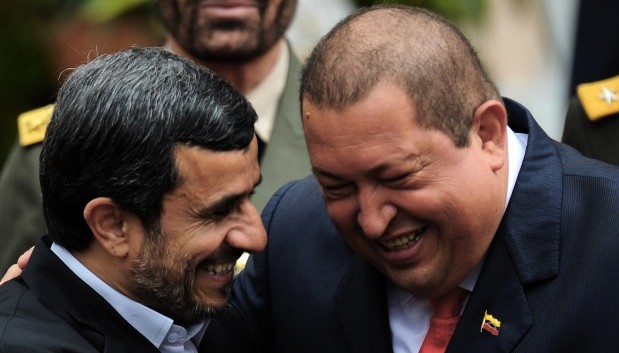It seems that the metaphysical influence of Iranian President Mahmoud Ahmadinejad has even reached Caracas, the capital of revolutionary Venezuela.
Ahmadinejad raised a messianic whirlwind in his obituary for Venezuelan President Hugo Chavez, portraying him as a “caliph,” among other religious terms.
Elsewhere, acting Venezuelan president Nicolas Maduro, commenting on an Argentinian being elected as the new pope, stated that the recently departed Chavez perhaps had a hand in his election.
Speaking at a book fair in Caracas, Maduro said: “We know that our commander ascended to the heights and is face to face with Christ. Something influenced the choice of a South American pope, someone new arrived at Christ’s side and said to him: Well, it seems to us South America’s time has come.”
Before this, Iranian President Mahmoud Ahmadinejad wrote two messages paying tribute to the Venezuelan president. In the later message, he said that Chavez will “return on resurrection day” along with Jesus Christ and Imam Mahdi and “establish peace, justice, and kindness” on earth. These statements incited a number of angry responses from Shia religious scholars, particularly his comparison of Chavez with the Imam Mahdi, who many Shi’ites recognize as being Sahab az-Zaman (the Master of the Age) and a key figure in Islamic eschatology.
This brings us to a very dangerous issue, namely the use of divine or sacred terminology and discourse in worldly affairs. In other words, the mixing of religion and politics. This is something, as demonstrated by the above example, which is not limited to any single religion. We can see this in every religion and during every age, including at the hands of both Sunnis and Shi’ites who trade on religion, as well as Christians, Jews, and others.
The use of religion in politics and political battles is on the rise these days. This is something that reminds me of a story from Arab history.
Suraqah Al-Bariqi was a well-known poet who was noted for his wit. During a battle with the forces of Al-Mukhtar (who led an abortive rebellion against the Umayyad Caliphate) he found himself captured and brought before the rebel leader. He asked him: “Was it you who took me prisoner? No, I was taken prisoner by men wearing white garments and riding piebald horses.”
Al-Mukhtar replied: “Those were the angels” and released him.
Later on, Al-Bariqi composed the following verses:
Tell Abu Ishaq [Al-Mukhtar] that I
Saw that the piebald horses were black and of one color!
I make my eyes see what they did not see;
Both of us are experts in lies!
It seems that these delusional piebald horses continue to roam free, this time from Caracas to Tehran.
